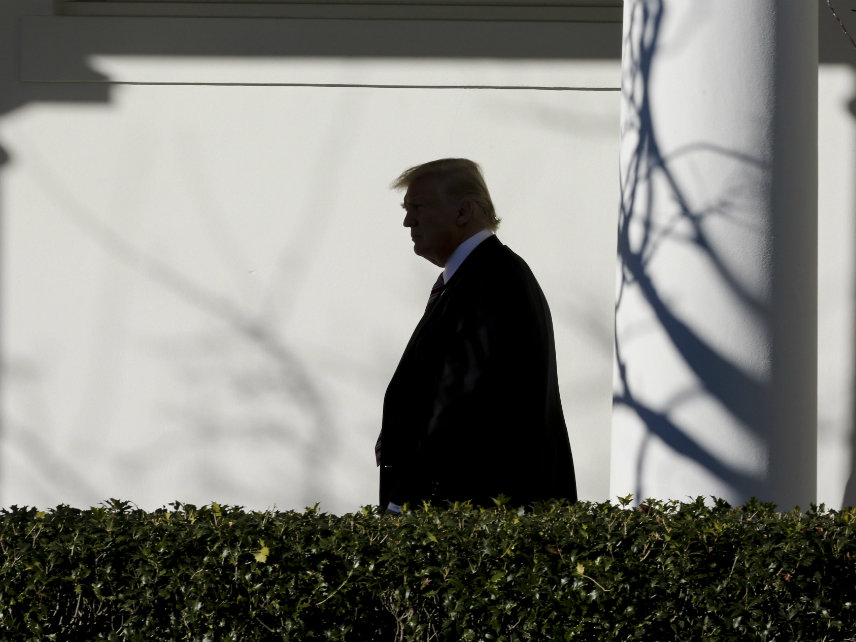Trump Campaign Foreign Policy Adviser's Guilty Plea Could Be More Important Than Manafort's Indictment
George Papadopoulos lied about contact with people connected to the Russian government, the FBI says. He's been answering questions for the feds since July.

George Papadopoulos, who served as a top foreign policy adviser to President Donald Trump's campaign, pleaded guilty to making false statements to the FBI, according to documents unsealed by the U.S. Justice Department on Monday.
According to the FBI, Papadopoulos had contact with a professor "understood to have substantial connections to Russian government officials," and with a "female Russian national," whom he sought to use as a conduit between the Trump campaign and the Russian government.
When questioned in January about his meetings and communications with both individuals, Papadopoulos gave false statements and omitted information that impeded the FBI's investigation into possible links between the Trump campaign and the Russian government, the indictment claims.
Papadopoulos was arrested in July at Dulles International Airport. Since then, he has "met with the government on numerous occasions to provide information and answer questions," according to the indictment unsealed Monday.
While the indictment of Paul Manafort, the former chairman of President Donald Trump's campaign (and of Rick Gates, a longtime Manafort associate) dominated headlines on Monday morning, there are several reasons to believe the indictment of Papadopoulos—and his guilty plea—may actually be more important.
First, as Reason's Scott Shackford noted earlier this morning, the Manafort indictment is far from the smoking gun that many in the anti-Trump crowd hoped it to be. Manafort is accused of taking money to lobby for Ukraine and laundering it through other countries and businesses so that they he wouldn't have to publicly account for it and pay taxes on it, but the alleged criminal activity seems to have occurred prior to and independent of Manafort joining the Trump campaign. That Trump hired someone with such questionable dealings certainly reflects poorly on the president's judgment and sense of character, but that's hardly new territory for the current occupant of the White House.
Second, Papadopoulos' indictment has a much more significant nexus with the actual Trump campaign. According to the FBI, Papadopoulos began communicating with the unnamed "professor" in March 2016, shortly before taking the role of foreign policy adviser to the Trump campaign. The professor and Papadopoulos met on several occasions in Italy and London, according to the court documents, and during one of those meetings in April 2016, the professor told Papadopoulos that Russia had "dirt" on Hillary Clinton, including thousands of Clinton's emails. Papadopoulos shared that information with higher-ups in the Trump campaign.
Third, Papadopoulos—unlike Manafort and Gates—has already pleaded guilty and has been answering questions for the FBI for months. After his initial interview with the FBI in January, Papadopoulos was called back for a second interview in February. Around the same time, the FBI says, he deleted his Facebook account (which he had used to contact the professor and a woman with ties to the Russian government) and changed his cell phone number. Papadopoulos was arrested on July 27.
We don't know what additional information Papadopoulos has provided to the FBI since July, and we don't know whether Papadopoulos' guilty plea is an indication that the feds convinced him to "flip." Like the Manafort indictment, it's possible that announcing Papadopoulos' charges and plea are merely meant to scare other potential targets of the investigation into cooperating with the FBI as the probe continues.
On the other hand, as Harvard law professor Alex Whiting has suggested, these may be nothing more than easy charges that fell into special prosecutor Robert Mueller's lap.
Without knowing the prosecutorial strategy being employed by Mueller, it's hard to draw any conclusions from what we've seen this morning. Still, the Papadopoulos plea seems the more important development.


Show Comments (116)